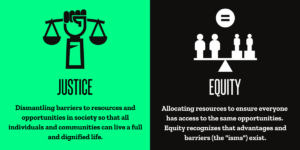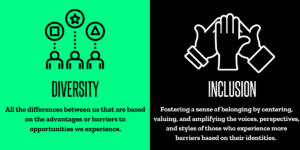JUSTICE | EQUITY | DIVERSITY | INCLUSION
Justice, equity, diversity, and inclusion (JEDI) is an integral part of Big Brothers Big Sisters of Southern Minnesota's mission and values. We recognize, affirm, and celebrate the diverse backgrounds, lives, and experiences of all our stakeholders, including youth, families, donors, volunteers, and staff. We affirm that every person (regardless of ability, age, cultural background, ethnicity, faith, gender, gender identity, gender expression, ideology, income, national origin, race or sexual orientation, marital or veteran status) has the opportunity to reach their full potential. We strive to ensure that all voices and perspectives are heard and honored.
We welcome all youth, including those in the LGBTQIA+ community, and do not discriminate based on race, color, religion, sex, gender, sexual orientation, gender identity or expression, or ability. We strive to create and cultivate a safe environment where all individuals feel respected, belonged, and valued.

Why does JEDI matter?
JEDI work widens the circle so that all youth can belong and have equitable access to opportunity, especially those who are historically left out. JEDI includes every young person, no matter their background, identity, or culture. Our vision is that all children achieve their full potential.
As mentors, we are constantly learning to act in humility and be inquisitive. We understand there is no singular lived experience, value, or perspective; the impact of our relationships is realizing the rich beauty in diversity. We want youth to feel safe and able to express themselves fully while recognizing and honoring what makes them unique.
The four tenets of JEDI support our long-standing commitment to amplify and uplift all young people. In addition to the more recognized tenants of Diversity, Equity, & Inclusion (DEI), BBBS of Southern MN intentionally applies justice to our work to focus us on transforming internal systems and structures that create inequity. Justice challenges everyone to take responsibility for change.
 |  |
JEDI in Practice
BBBS of Southern MN has taken bold steps in investing time and resources in JEDI:
- Established a board and staff JEDI committee responsible for analyzing and implementing JEDI in all functions of the agency
- Required JEDI trainings for staff and board members
- Greater intentional commitment to JEDI on the board including actively questioning, considering, and rethinking how JEDI is infused into each conversation and decision in the governance of the board
We hope you will join us on our journey. We don’t have all the answers; we are taking this process one step at a time. For JEDI work to be prioritized and sustained, we need all stakeholders to understand that this work is everyone’s shared responsibility. Here are some ways you can stand alongside us:
- Use Strengths-Based Language: Use language that focuses on the positive aspects of our stakeholders versus the negatives. Some of our Littles and families may be facing adversity, but it does not define them. At BBBS of Southern MN we highlight the power of youth mentoring in creating strong relationships that benefit both the Little and the Big.
- Check for Feelings of Saviorism: Young people do not need to be saved. They need to be heard, believed in, and supported. Mentors are another caring adult in a young person’s life, reinforcing the support network already provided by family, friends, and community partners.
- Be OK with Being Uncomfortable: JEDI work can be uncomfortable. You may experience feelings of shame, regret, anger, or sadness. This doesn’t mean that we end our journey and this doesn’t make the work illegitimate. Instead, we choose to acknowledge the discomfort and move forward. We encourage mentors to talk about difficult topics that are important to their Little. It’s okay that mentors don’t have all of the answers. Show that you care by investing time and effort into working through discomfort and staying engaged.
- Allow for Multiple Perspectives: JEDI requires us to recognize our own biases and examine how they influence our decisions. JEDI work helps us understand how our values and assumptions have been formed by our individual experiences, and encourages us to make room for others. It’s not uncommon that mentors have different values, opinions, and beliefs than their Little. Mentorship is not about changing minds, but about looking beyond ourselves and seeking new ways of understanding the world.
- Recognize Your Presumptions: The youth in our programs already have a caring adult in their life, whether that be a parent, guardian, caregiver, or relative. Mentors partner with these adults to expand and strengthen the Little’s support network. Remember, all youth can benefit from another caring adult in their life.
